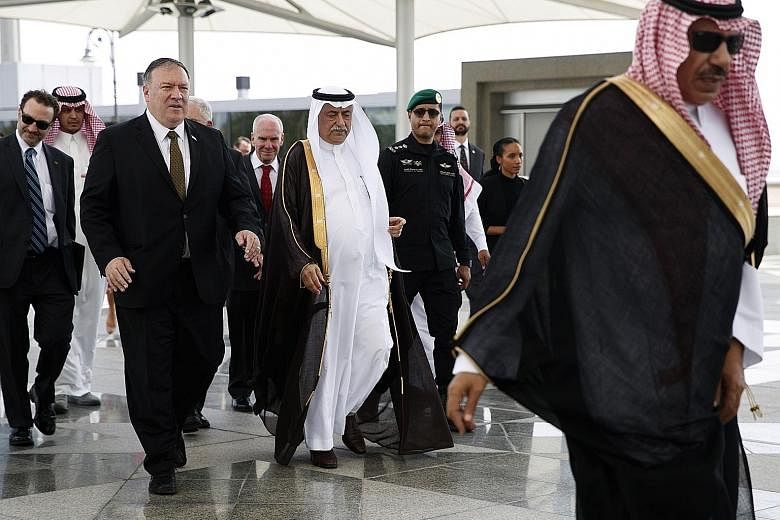LONDON/TEHERAN • If the United States wants Iran to offer concessions that go beyond the terms of its 2015 nuclear deal, Washington must offer incentives that also exceed those in the deal, an adviser to Iranian President Hassan Rouhani said yesterday.
The comments were a rare indication from Teheran that it could discuss new concessions with Washington, although the adviser, Mr Hesameddin Ashena, repeated Iran's line that any talks were impossible until Washington lifted sanctions it has reimposed since withdrawing from the deal last year.
"The US offer for negotiations with no precondition is not acceptable while sanctions and threats continue. If they want something beyond the JCPOA (the nuclear deal), they should offer something beyond the JCPOA, with international guarantees," Mr Ashena said in a Twitter post.
Iran also denied that it was hit by a US cyber attack as Washington was due to tighten sanctions on Teheran in the stand-off sparked by the US withdrawal from the nuclear deal. Iran said the new economic sanctions will have no impact.
"We really do not know what (the new sanctions) are and what they want to target anymore, and also do not consider them to have any impact," Foreign Ministry spokesman Abbas Mousavi said at a news conference in Teheran. "Are there really any sanctions left that the United States has not imposed on our country recently or in the past 40 years?"
Both nations say they want to avoid going to war, but tensions have spiralled as a series of incidents, including tanker attacks and the shooting down of a US drone by Iran in the Gulf, raised fears of an unintended slide towards conflict.
The denial came as US Secretary of State Mike Pompeo arrived in Saudi Arabia for talks on the tensions with Iran, and was also due to visit the United Arab Emirates for similar discussions.
US President Donald Trump called off a planned retaliatory military strike last Friday after Iran said it had shot down an American surveillance drone the previous day near the strategic Strait of Hormuz.
Teheran said the drone violated Iranian airspace and Foreign Minister Mohammad Javad Zarif has backed the claim with maps and coordinates - allegations dismissed by Washington.
US media reports said Mr Trump ordered a retaliatory cyber attack against Iranian missile control systems and a spy network after the drone was shot down.
But yesterday, Iranian Telecommunications Minister Mohammad Javad Azari Jahromi said no cyber attack against his country had ever succeeded. "The media are asking about the veracity of the alleged cyber attack against Iran. No successful attack has been carried out by them, although they are making a lot of effort," he said.
He acknowledged that Iran has "been facing cyber terrorism, such as Stuxnet", naming a virus believed to have been engineered by Israel and the US to damage nuclear facilities in Iran. "We foiled last year not one attack but 33 million attacks with the Dejpha shield," Mr Azari Jahromi said, referring to a new Internet defence system.
Iran last week warned that any US attack would see Washington's interests in the Middle East go up in flames.
Speaking to reporters as he left Washington, Mr Pompeo called Saudi Arabia and the United Arab Emirates "two great allies in the challenge that Iran presents".
"We will be talking with them about how to make sure that we are all strategically aligned and how we can build a global coalition," he said.
He reiterated Mr Trump's offer of dialogue to improve relations with Iran, which the US administration has sought to isolate through harsh sanctions. "We are prepared to negotiate with no preconditions. They know precisely how to find us."
Mr Trump, who spent Saturday huddling with his advisers, said he was ready to reach out to Iran if the country agreed to renounce nuclear weapons. "When they agree to that, they are going to have a wealthy country. They are going to be so happy, and I am going to be their best friend," he told reporters.
Iran has denied seeking a nuclear weapon, and says its programme is for civilian purposes. The landmark 2015 nuclear deal sought to curb Iran's nuclear ambitions in exchange for sanctions relief. Mr Trump left that agreement more than a year ago and has imposed a robust slate of punitive economic sanctions designed to choke off Iranian oil sales and cripple its economy.
REUTERS, AGENCE FRANCE-PRESSE

